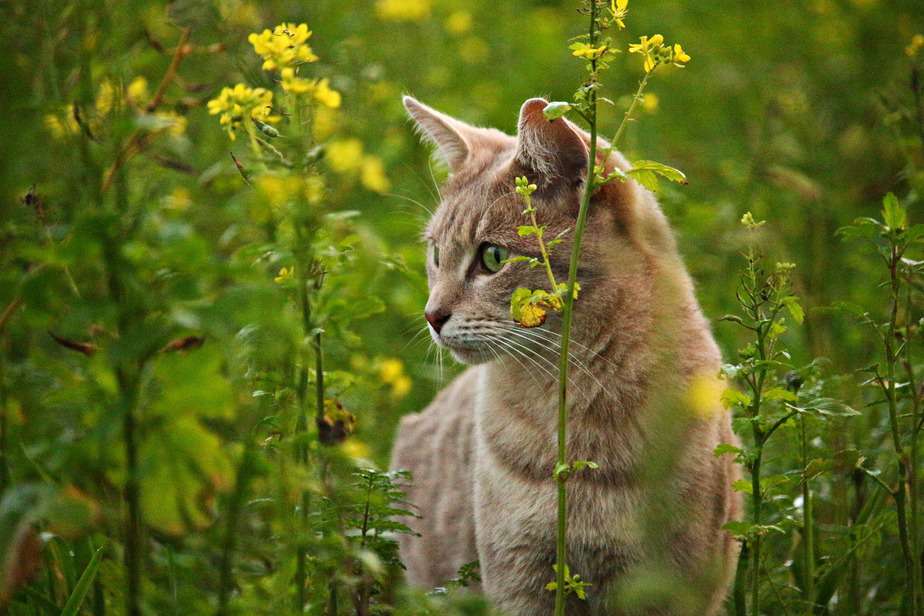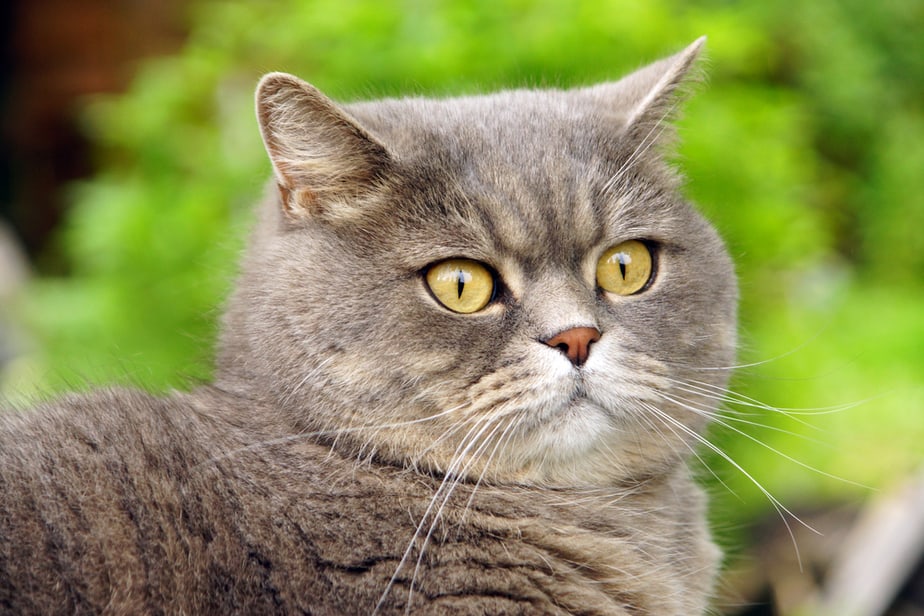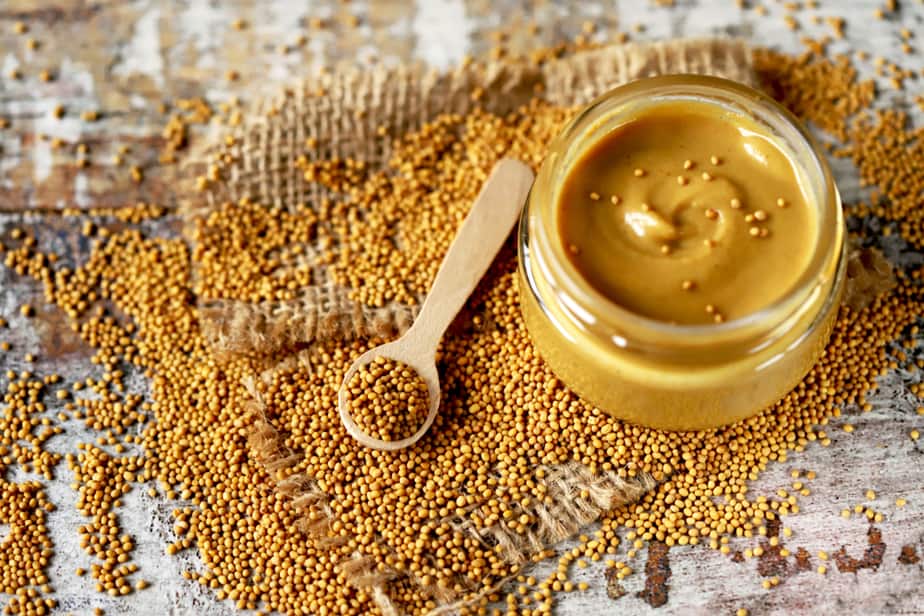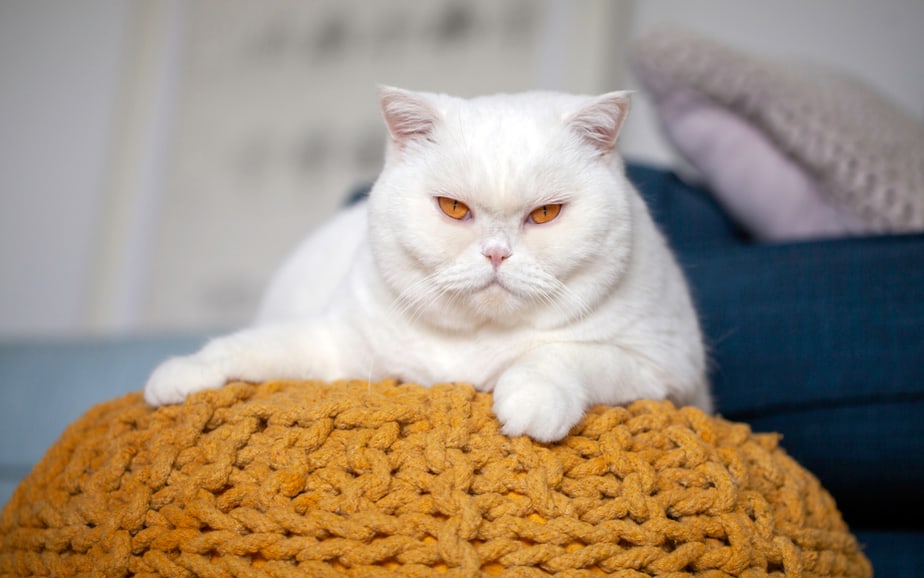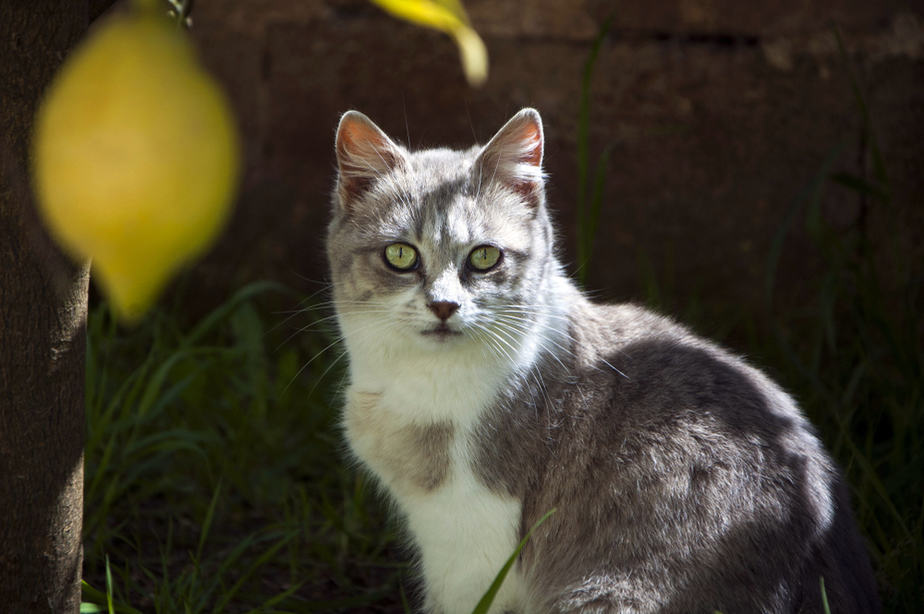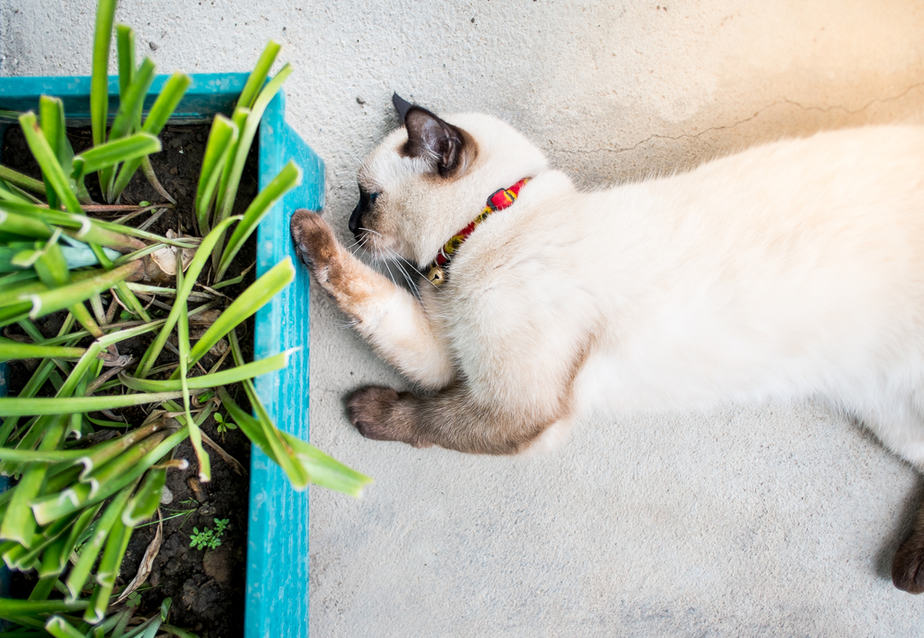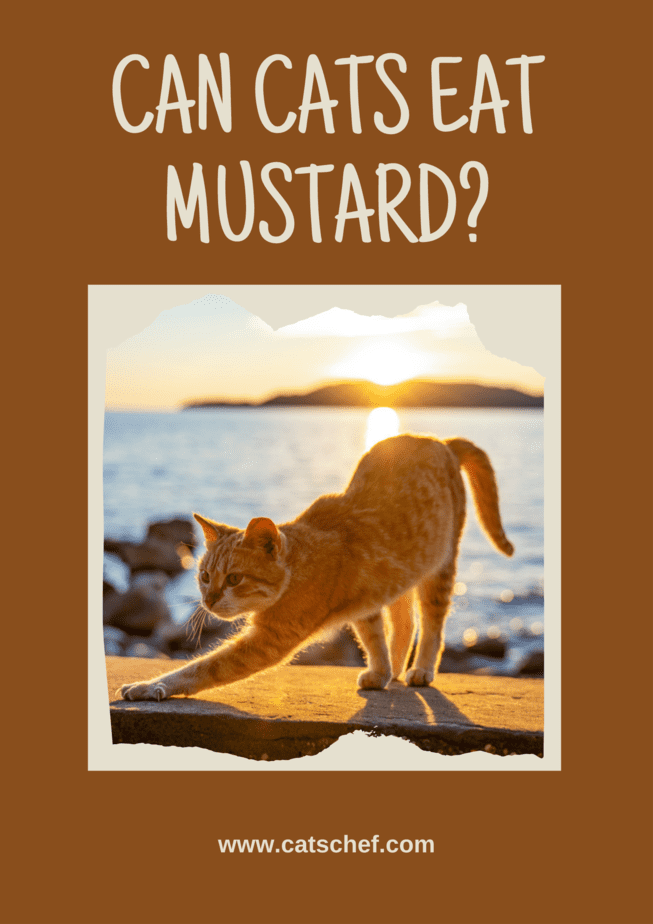📖 Table of Content:
As cat parents, we’re always dealing with the problem of our cats stealing food. This wouldn’t be a headache if there weren’t certain sauces and dips that could harm our furkids. This makes us wonder can cats eat mustard if they sneak away with some of it?
It’s hard dealing with these stealthy creatures, but what would we do without them? Yes, they can give us a mini heart attack sometimes, especially when we see them munching down on our food!
Sharing is caring, but you have to know when to be selfish. When it comes to mustard, you should keep it all to yourself for various reasons.
Cats are pretty simple creatures, believe it or not. When it comes to food and their dietary requirements, all you have to do is provide them with a meat-based diet. That way, your furry friend will get all the nutrients that are essential for maintaining optimal health.
They may be able to eat mustard as well, but that doesn’t mean they should. If you leave some hot dog leftovers unattended, the curiosity may get the best of your pet.
Can cats eat mustard? Is it bad for them?
Yes, mustard is bad for cats. Felines are built differently than humans and therefore, require a different diet. They find it hard to gulp down some human foods, and it would be the same if we were to try cat food, right?
Besides, I don’t think cats are crazy about mustard. It has a strong smell and a tangy flavor which is not appealing to them. Just like ketchup, you should keep this sauce out of your pet’s reach.
Do cats even like mustard?
Humans frequently disregard the product information on the back of the bottle since mustard is popular. Having a cat may encourage you to reconsider your choices, since some of the components may be harmful to her.
Humans are accustomed to eating a wide range of sweet, spicy, and sour meals, with all kinds of condiments. Cats, on the other hand, might be endangered by some of these foods that don’t pose harm to humans.
However, maybe you don’t have to be so worried about cats eating mustard. The taste of the seed is robust, spicy, and slightly bitter. Mustard condiments come in a variety of flavors, from sweet to spicy.
The strong smell and flavor could deter your feline from even trying mustard, but if she has a lick or two, don’t panic. Still, you shouldn’t encourage her to give it a go.
What is mustard made of?
To understand why mustard is so bad for your furkid, let’s break down the main ingredients. This condiment is made of mustard seeds that are unhealthy for felines. You can also find various spices in this condiment.
Garlic, salt, vinegar, lemon juice, and wine are just some of the ingredients found in mustard. You don’t have to be a veterinarian to think about how all of these ingredients might affect your feline!
1. Can cats eat mustard seeds?
Mustard seeds aren’t toxic to cats but could cause gastrointestinal problems. Some even argue that these can benefit felines due to their antioxidant properties. However, they aren’t recommended as they have a low nutritional value.
These tiny seeds also have antibacterial characteristics. This could help heal, rejuvenate, and moisturize the skin. Besides, they’re abundant in selenium which is important for your cat’s health.
Selenium is an antioxidant that fights oxidative stress and aids in the prevention of chronic diseases, including heart disease and cancer. It assures the proper function of your feline’s immune system.
Higher doses of selenium may help ease the symptoms of more serious illnesses in cats. However, mustard seeds could also cause an upset stomach resulting in vomiting, diarrhea, and abdominal pain – so be careful on the dosage.
2. Salt and garlic – a threat to your pet’s health
While salt makes a great part of our everyday meals, it isn’t necessarily safe for your pet. Salt is sodium chloride in its purest form, and while it’s entirely harmless for humans, it can be deadly for cats.
Humans use salt in the kitchen every day, and what better place for cats to be than in the kitchen? Because of its high salt content, mustard can be dangerous to felines.
One tablespoon of mustard can contain up to 150 milligrams of salt. When you consider that even one teaspoon of salt is hazardous to your cat, the math has us concerned!
Consumption of salt might make your pet feel uneasy and unwell. It can also cause diarrhea, vomiting, and dehydration.
While one cat may experience these milder symptoms, other cats may experience more severe symptoms such as seizures, coma, and tremors. Cats, like humans, are unique, so what works for one might not work for another.
Garlic is one of the elements that are harmful to our four-legged family members. It’s a big no-no for kittens, despite its widespread use in human cuisine. Garlic includes chemicals that are poisonous to cats and can cause red blood cell destruction.
Even if garlic is five times more powerful than onion, it should also be avoided. It can cause serious health problems for your cat by destroying red blood cells, leading to various types of anemia.
We can conclude that garlic and onion, in any form, provide a health risk to your cat. Whether powdered, cooked, raw, or whatever, your pet is better off without them.
What about liquids?
Yes, we know cats are liquid as they can basically fit anywhere. But, we’re talking about different liquids, the ones that are used in making mustard. This condiment’s content might come as surprising and, unfortunately, it isn’t a nice kind of surprise for your furkid.
Can cats eat mustard because of these ingredients? No! It’s simple as that. Mustard contains vinegar, wine, and lemon juice. You don’t have to be an expert to see what’s wrong with these.
1. Vinegar and wine
We don’t like the scent of vinegar, so we can bet it’s not one of our cat’s favorites either. It contains acetic acid, which can help humans regulate their blood sugar levels, but it’s not an ideal choice for our kitties.
Some furballs are allergic to vinegar, which can result in rashes on their sensitive skin. Aside from that, vinegar’s strong acid content can harm your cat’s digestive tract.
Alcohol is extremely harmful to felines simply due to their tiny bodies (compared to their human friends). What we might think of as a modest sip of wine or beer is actually quite dangerous to our pets, and can put their life in jeopardy.
It’s also worth noting that alcohol-infused foods, which can range from all kinds might be harmful to a pet’s health. Additionally, any household goods, such as syrups and cleaning solutions, should be kept out of reach of your pet or kept under human supervision while not in use.
Alcohol poisoning in cats could be detected through some of the symptoms: vomiting, diarrhea, headache, dizziness, stomach pain, fatigue, and others. While it can be rare for cats to get alcohol poisoning from mustard, the risk is still there.
2. Can cats eat mustard because of lemon juice?
Unfortunately, no. Lemon comes from the citrus fruit family and can be toxic to felines. The acids contained in fruits like lemon are harmful to your pet. This means that lemon juice is off the limits, as well as lemonade.
Besides, lemon juice isn’t something that would entice our cat’s senses. Our furkids have a stronger sense of smell, and while humans like these strong aromas, cats don’t.
They find it rather repulsive and citrus fruits are often used as a cat deterrent. Just like black pepper, it works wonders, can be made at home and is cheaper than what’s offered in the store!
Can cats eat mustard greens?
Good news, everyone! Mustard greens are not poisonous to felines. This doesn’t mean cats can eat mustard greens in unlimited quantities, but they could be served as a rare treat from time to time.
Mustard greens are leaves of the mustard plant, which is the source of one of the world’s most popular condiments, mustard. We have established that it isn’t the best option for your pet and contains some ingredients that are harmful to pets.
However, mustard greens could have a few benefits to your furbaby’s health. These are rich in vitamins A and C which are very important for the immune system. They also play an important role in keeping the lungs, eyesight, and kidneys healthy.
Besides, they’re a source of antioxidants that help fight free radicals in your feline’s body. They can help prevent certain heart diseases and reduce inflammation. Cats who suffer from arthritis and other chronic diseases could benefit from foods rich in antioxidants.
Another important health supplement found in mustard greens is vitamin K. It’s essential for cardiac health and helps with blood clotting. Just like calcium, it also works to keep your pet’s bones stronger. If your pet has enough of this vitamin, it could help prevent fractures!
The good news is that mustard greens have zero fat with some traces of protein. This protein isn’t enough to satisfy your pet’s needs and is derived from plants. Nevertheless, it could be a good addition to your cat’s diet on rare occasions.
Downsides of cats eating mustard greens
Life has its good and bad sides and so do mustard greens. With all the health benefits, your cat could experience some health problems consuming these leaves.
Oxalates are also abundant in leafy greens, which may increase the risk of kidney stones in felines with kidney disease. Besides, your pet could showcase signs of gastric distress.
The only way to feed mustard greens to your cat is to cook them. I don’t think she would be delighted when offered raw leaves. After all, cats are carnivores and greens are at the bottom of their food list.
Mustard greens and seeds are good for people because they are high in vitamins and fiber, but they are not recommended for cats. Your kitty friend does require these nutrients, but not from a mustard plant!
Can cats eat mustard or mustard greens on a daily basis?
If your pet stole your hot dog with some mustard on it, it’s fine. Felines can have a lick or two of mustard, but don’t even think about making it a regular part of their diet. As for mustard greens, they’re not poisonous to cats and hold quite a few health benefits as long as you keep them plain and cooked.
Look out for any signs of stomach distress and if you see any, consult with your vet as soon as possible. While mustard seeds aren’t toxic to cats, mustard contains ingredients that are. Garlic, salt, vinegar, and wine are all contained in this condiment. These ingredients can harm your cat in many ways.
